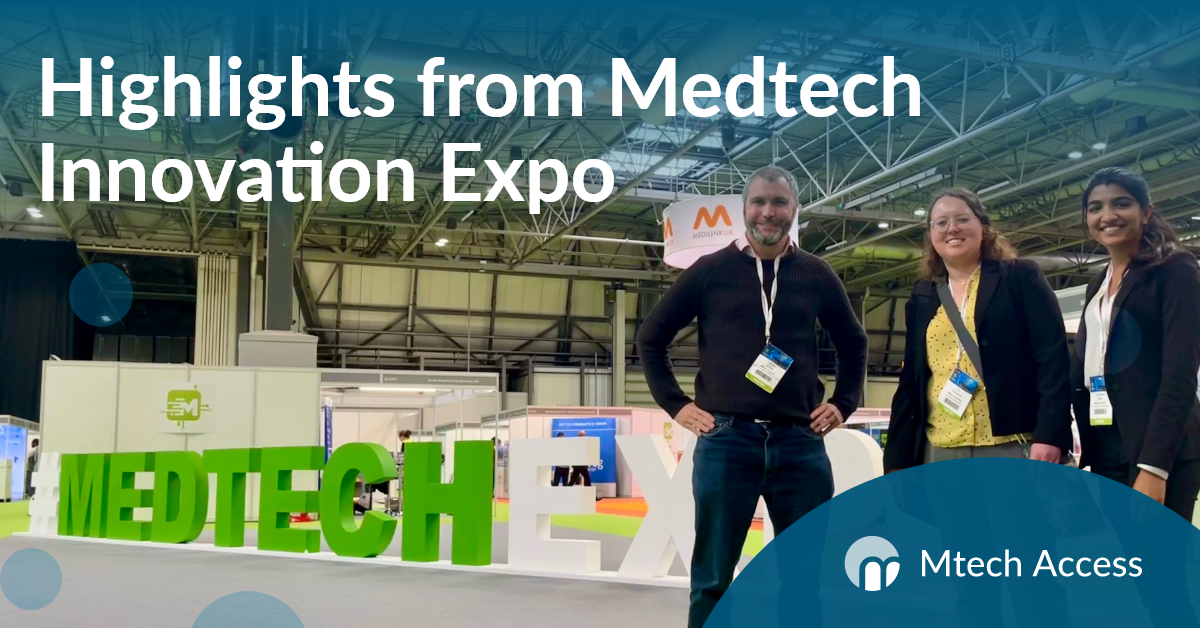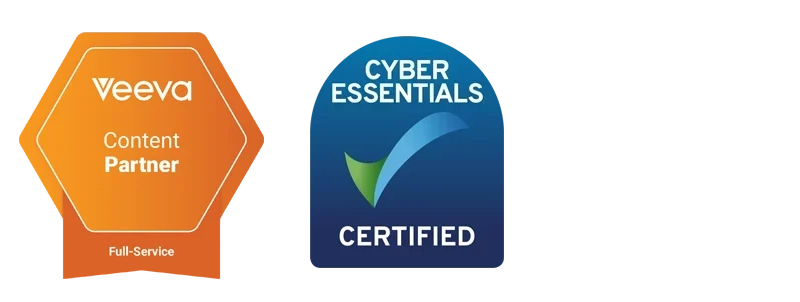
Patient-centric design, ingenuity and a resilient drive to get new technologies to market were all on display at Medtech Innovation Expo. On 8th–9th June 2022 Calum Jones, Lily Westbrook and Parishee Desai from our Health Economics and Commercial teams attended the conference at the NEC in Birmingham. We met innovators from across the UK and wider European Medtech industry and attended some thought-provoking talks from a range of industry speakers.
Our highlight was undoubtedly the opportunity to speak with a diverse range of innovators and suppliers form across the Medical Device, Diagnostics and Biotech landscapes. The breadth of innovation was truly inspiring.
The passion and creativity on display on the stands was matched by the variety of topics covered in the presentations and panel discussions. Split across two stages, the ‘Med-tech Innovation’ stage and the ‘Introducing Health-Tech’ stage, topics included how to get a product into the NHS, overcoming regulatory challenges, evaluating cost effectiveness, innovating to rebalance health inequalities for women, global export opportunities, designing Medtech for an ageing population and tips and advice for start-up and growing Medtech companies.
Medtech innovations coming to market
We particularly enjoyed the pitch competition that concluded Day 2 on the ‘Introducing Health-Tech’ stage, where a number of Medtech innovators were given the opportunity to share their products and business strategies. Here we saw a number of exciting new technologies with the potential to vastly improve patient outcomes.
Throughout the expo, several of the sessions offered Medtech innovators tips on how to bring their technologies to market. The presentation on ‘How to get a product into the NHS’ delivered by Simon Leigh (Head of Research and Health Economist, ORCHA) particularly resonated with us. He advised innovators to focus on patient, economic and operational outcomes when generating evidence, and suggested prioritising cost-consequence analyses over other forms of economic evaluation for certain technologies. Indeed, Calum has previously presented a webinar on this subject, where they explored the most relevant health economic modelling approaches for Medtech innovations.
Another stand-out presentation in this area was ‘Pitfalls to avoid as a small business and start-up in healthcare’ given by Evelyne Priestman (Consultant Health Economist, Health Tech Enterprise). As the title suggests, she outlined obstacles to be navigated on the route to market, advising Medtech innovators be aware of the market and its dynamics, to ensure they understand the needs of customers (patients, providers and budget holders), and to ensure that they have a good understanding of the complex payment and reimbursement landscape. We firmly agree that these should be priorities for Medtech companies, and are all areas where experienced market access experts can assist them.
Innovation in diagnostics
A notable highlight was the session given by Karen Taylor (Director, Deloitte Centre for Health Solutions) on ‘Innovation in Diagnostics’. Karen shared findings and insights from a soon-to-be-released report comparing the views of clinicians and Medtech innovators. Among the key industry trends that Karen outlined was the fact that the strain of the pandemic backlog in healthcare was particularly acute for diagnostics, since some form of diagnostic test is key to the majority of medical decisions.
Karen also discussed the movement of diagnostics from hospital to community and at-home settings and how this was accelerated by the pandemic and the ubiquitous use of in-home diagnostic tests. She noted that this is increasingly supported in the UK by NHS policy as NHS England moves towards an integrated care model and looks to move diagnostics and treatment out of secondary care where possible. Karen mentioned there may be increased opportunities for diagnostic companies to work with the NHS on population health management, as this strategy requires accurate data and, therefore, the diagnostics to provide this.
Global opportunities for Medtech
Alongside consideration of UK NHS-related issues, the expo offered the opportunity to explore global opportunities for Medtech. A number of Medtech innovators had travelled from Italy to showcase their technologies, with the support of the Italian Trade Agency, and there was a presentation from representatives from Hessen Trade and Investment in Germany who were looking to support innovators looking for a base in central Europe.
We attended an interesting talk by Aphrodite Spanou (Director Healthcare, Life Sciences & Chemicals Directorate, Department for International Trade) on ‘Go global: export opportunities for Medtech’. This session highlighted both the opportunities in the UK and how the Department for International Trade could support Medtech innovators looking to take their technology to other global markets. Aphrodite noted that one of the reasons the UK has such a thriving Medtech sector and is widely seen as “the home of life sciences”, is that we have great collaboration between the public sector, the NHS, academia, and commercial companies.
Mtech Access and Medtech innovations
Here at Mtech Access, we help innovators in Medtech and Diagnostics achieve market access by supporting them in developing their value propositions and pricing strategies, and mapping their routes to engage with the NHS and other healthcare systems across Europe. Where applicable, we generate evidence and prepare Medical Technologies Evaluation Programme (MTEP) submissions for NICE. We also build budget impact models, digital presentation tools, and interactive PDFs to help Medtech representatives showcase their products to healthcare decision-makers and budget holders.
If you’d like to explore how we can help your Medtech innovation reach patients email info@mtechaccess.co.uk.


